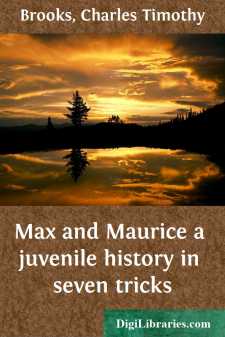Poetry Books
Sort by:
I PRELUDE: THE TROOPS Dim, gradual thinning of the shapeless gloomShudders to drizzling daybreak that revealsDisconsolate men who stamp their sodden bootsAnd turn dulled, sunken faces to the skyHaggard and hopeless. They, who have beaten downThe stale despair of night, must now renewTheir desolation in the truce of dawn,Murdering the livid hours that grope for peace. Yet these, who cling to life with...
more...
by:
R. C. Lehmann
THE VAGABOND It was deadly cold in Danbury town One terrible night in mid November, A night that the Danbury folk rememberFor the sleety wind that hammered them down,That chilled their faces and chapped their skin, And froze their fingers and bit their feet,And made them ice to the heart within, And spattered and scattered And shattered and batteredTheir shivering bodies...
more...
by:
Edward Dyson
BILLY KHAKI MARCHING somewhat out of order when the band is cock-a-hoop,There's a lilting kind of magic in the swagger of the troop,Swinging all aboard the steamer with her nose toward the sea.What is calling, Billy Khaki, that you're foot- ing it so free? Though his lines are none too level, And he lacks a bit of style.And he's swanking like the devil Where...
more...
THE COLORS It isn't just colors and bunting—The red and the blue and the white.It's something heaps better and finer,—It's the soul of my country in sight! There's a lot of ceremony 'bout the Flag,Though many half-baked patriots believeSalutin' it and hangin' it correct"Is only loyalty upon the sleeve."But we who work beneath the Flag to-day,Who'll...
more...
by:
Robert Graves
A FROSTY NIGHT. Mother Alice, dear, what ails you,Dazed and white and shaken?Has the chill night numbed you?Is it fright you have taken? Alice Mother, I am very well,I felt never better,Mother, do not hold me so,Let me write my letter. Mother Sweet, my dear, what ails you? Alice No, but I am well;The night was cold and frosty,There's no more to tell. Mother Ay, the night was frosty,Coldly gaped...
more...
by:
John Oxenham
PART ONE: "ALL'S WELL!" GOD IS God is; God sees; God loves; God knows. And Right is Right; And Right is Might. In the full ripeness of His Time, All these His vast prepotencies Shall round their grace-work to the prime Of full accomplishment, And we shall see the plan sublime Of His beneficent intent. Live on...
more...
INTRODUCTION Sassoon the Man In appearance he is tall, big-boned, loosely built. He is clean-shaven, pale or with a flush; has a heavy jaw, wide mouth with the upper lip slightly protruding and the curve of it very pronounced like that of a shrivelled leaf (as I have noticed is common in many poets). His nose is aquiline, the nostrils being wide and heavily arched. This characteristic and the fullness,...
more...
ARE WOMEN PEOPLE? A Consistent Anti to Her Son("Look at the hazards, the risks, the physical dangers that ladies would be exposed to at the polls."—Anti-suffrage speech.)You're twenty-one to-day, Willie, And a danger lurks at the door, I've known about it always, But I never spoke before; When you were only a baby It seemed so very remote, But you're twenty-one to-day, Willie,...
more...
MAX AND MAURICE. PREFACE.Ah, how oft we read or hear ofBoys we almost stand in fear of!For example, take these storiesOf two youths, named Max and Maurice,Who, instead of early turningTheir young minds to useful learning,Often leered with horrid featuresAt their lessons and their teachers.Look now at the empty head: heIs for mischief always ready.Teasing creatures, climbing fences,Stealing apples,...
more...
Bring the good old bugle, boys, we’ll sing another song,Sing it with the spirit that will start the world along,—Sing it as we used to sing it, fifty thousand strong,While we were marching through Georgia. Chorus. “Hurrah! hurrah! we bring the Jubilee!Hurrah! hurrah! the flag that makes you free!”So we sang the chorus from Atlanta to the seaWhile we were marching through Georgia.How the...
more...











